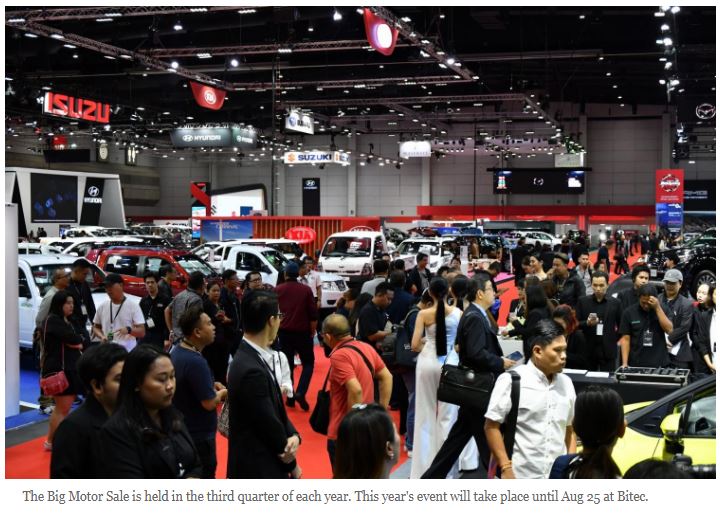Thailand: Lower car sales on the cards
Overall car sales are expected to contract throughout the third quarter of 2019 after figures in July remained in the red for a second straight month, attributed to financial institutions tightening their car loan conditions in line with the Bank of Thailand’s warning, say local distributors.
The automotive industry club of the Federation of Thai Industries (FTI) reported that car sales in June fell for the first time in 30 months with 86,048 cars sold, down 2.1% year-on-year.
Wallop Treererkngam, executive director for sales and marketing at Suzuki Motor Thailand, said sales in July also dropped slightly, by 1% year-on-year, which would pressure car sales in August and September.
“Every car brand is suffering from the tighter auto loan criteria,” he said.
The central bank sought to inspect car marketing campaigns featuring lax criteria for auto loan approvals in early April, especially cashback and top-up loan incentives.
The Bank of Thailand has yet to launch new measures after the examination, but many banks tightened their loan conditions, Mr Wallop said.
“The country’s weak economic sentiment has not helped car purchases and there are no signs of an uptick for monthly car sales, so the market will wait for new model launches in the remaining months of 2019,” he said.
The fundamentals of the local market are healthy enough to bring full-year sales over 1 million cars, close to the 1.04 million units sold last year.
Wichit Wongwatthanakan, managing director of Ford Thailand, said car companies are normally in charge of local sales, but each purchase remain incomplete until buyers receive loan approvals from financial institutions.
“Banks have complete authority and car dealers have to accept their decisions,” he said.
Mr Wichit said the rejections can be categorised into two possible reasons. The first is that buyers fail to qualify after they are found to have limited borrowing credit when inspected by the National Credit Bureau.
The second is that buyers have borrowing capability but lenders require higher down payments or other guarantee documents that the buyer cannot provide.
Ford has a 20% rejection rate from its financial partners, Mr Wichit said.
He said each car company should train sales staff to have greater empathy and understanding on both sides — of buyers’ needs and lending criteria — in order to offer appropriate vehicles for buyers’ financial capabilities.
“This method can reduce rejections from banks, while car distributors can complete their deliveries,” Mr Wichit said.
Thee Permpongpanth, vice-president for marketing and government affairs at Mazda Sales Thailand, said that once the central bank launches new measures and conditions to handle the country’s auto loans and household debts, all financial institutions will use standardised norms to approve loan requests.
Thailand saw rapid growth from the first-time car buyer scheme 6-7 years ago, he said. Many financial campaigns are targeting new buyers and first-jobbers who may have low financial leverage, which then raises the possibility of non-performing loans (NPLs).
Mr Thee said NPLs in auto loans are high among eco-cars (300,000-500,000 baht) and single-cab pickups (500,000-700,000 baht) because those segments are made up of entry-level buyers.
Source: https://www.bangkokpost.com/business/1732639/lower-car-sales-on-the-cards


 Thailand
Thailand




